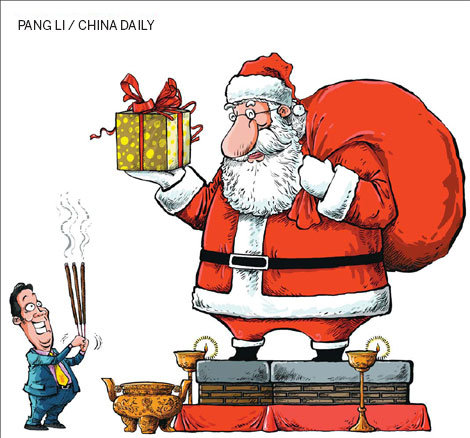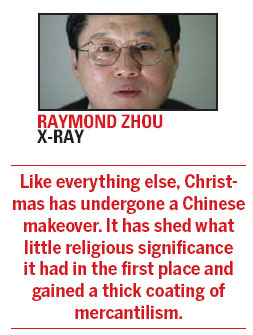Reveries of Christmas - Chinese style

Christmas with Chinese characteristics may bewilder purists, but it actually follows the pagan tradition of the holiday and is updated for the gilded age.
Christmas in China is a unique experience like nothing you've seen in other countries. It is not the height of the holiday season. Rather, it marks the beginning, which leads to the climax of the Lunar New Year a month or so later. In a sense, it is an exotic prelude to the real festival to come.
A decade ago, there were debates about the appropriateness of importing a noticeably foreign holiday into China.
But verbal wrangles are so feeble in the face of the tidal wave that is commercial interests.
There is not a holiday that merchants do not love. We have two calendars, one lunar and one Gregorian.
It's natural we now have two holidays for many occasions. For lovers, we have Valentine's Day and then the seventh day of the seventh month on the lunar calendar, based on some Chinese mythology.
Why can't we have two big year-end celebrations?
Of course, Christmas is not the equivalent of China's Lunar New Year - except in the obvious similarities, such as family reunions, binge eating and drinking, and endless rounds of gift-giving (with re-gifting a Chinese touch that amounts to recycling).
I bet not a lot of people associate Christmas for its religious origin.

If you ask around who was born on this day, many with a long memory may say Chairman Mao Zedong. Well, they missed by just one day. The Great Helmsman had his birthday on Dec 26, which always calls for some kind of red-banner commemoration in the official press.
I also bet a lot of people have confused Santa Claus with Jesus Christ.
"Santa is not religious. He does not have any political agenda," Lars Backstrom, Finland's ambassador to China, was quick to say.
He explained the difference at a recent media event showcasing his country's rich heritage of Santa-related folklore.
Actually, I was asking a Santa impersonator about his resemblance with Buddha: Both are jocular, have round bellies and grant wishes. What if Chinese kids mistake the jolly old man from the North Pole, whom they are not so familiar with, for the statue from the local temple coming alive in costume?
It would be quite conceivable to fuse the Santa legend with Buddhism. The arhats can be transformed into elves. (The Hollywood movie Ocean's 11 is translated as 11 Arhats in Chinese, and then 12 Arhats and 13 Arhats.)
The reindeer can easily morph into floating lotuses, which, if you think of it, make a much smoother ride.
No, I'm not trying to hijack the Christian essence of the occasion. Christmas is never a purely Christian holiday. As a matter of fact, nobody can prove Jesus Christ was born on this day.
The proposition that Dec 25 was his birthday was not floated until the 4th century. I once consulted an expert about the possibility that Jesus' birth fell on this day, and his answer was: 1 out of 365.
I bet a lot of people will be offended by this.
While the English word Christmas originated as a compounding of "Christ's mass", the Chinese name is explicitly the sacred birth.
And what is more sacred than conducting business in this gilded age?
The pagan rituals of Christmas have simply been replaced with a massive dose of commercialism, where everything on sale looks more appetizing when surrounded by glitzy decorations.
A couple of decades ago, a few of the really wealthy or well positioned would take a trip to Hong Kong to enjoy the holiday lights.
Now, every day is a holiday in China's metropolises. Colorful lights adorn shopping arcades and busy streets all year round.
During my early years in the United States, I used to lament the removal of decorations after New Year's Day.
Later, I learned one would receive a financial penalty if they were not taken down by Jan 10. Here, in China, my juvenile prayers have been answered.
One conspicuous absence is the Christmas carols.
While I was an undergrad in China, a pal of mine recorded a bunch of them off Voice of America, and they were played non-stop in the dormitory.
But no disc jockey in China went through this schooling.
Instead, some of the songs trickled into China as regular pop numbers.
So, do not be surprised if you hear a school radio system blaring Jingle Bells in the heat of summer. By the way, this is one of the earliest American tunes that seeped into China after it opened up and in the process was stripped of its holiday trimmings.
The biggest Christmas-themed business at that time - the 1980s - was greeting cards. The stack of cards represented your popularity - in the same vein as the number of friends on your Facebook or micro blog account.
Nowadays, Christmas Eve dinner seems to have taken over. Hotels and restaurants offer a dizzying array of overpriced choices, some including acts by entertainers du jour.
I wonder if Guo Degang tells jokes about how un-Western the holiday's evolution has been in China. There is a wealth of material to be mined.
For youngsters with more free time than fast money, the occasion provides an excuse to get a respite from the year-end pressure. The final exam is next week? What the heck, I've got to have fun tonight.
And what is more accessible than playing card or computer games throughout the night? Maybe the loser can don a Santa hat and streak across the campus. That'll gain him the bragging rights for weeks.
From an economic point of view, some of them should go out and find a job as a Santa impersonator. That'll give them some solid training in sizing up strangers and talking to the most difficult and also the most enviable demographic group - spoiled brats who can push their parents to buy anything on Earth, plus the moon.
Alas, Chinese merchants have not tapped this function of the big-belly man. Right now he is just a moving ornament to liven up the venue.
I won't get into nativity plays here. Kids would see it as another attempt by their parents to drum into them the suffering of the older generation.
"The guy was born in a manger? Do you mean his parents bought him a pony before he was born?"
The three magi would find a ready place in the Chinese pantheon of selecting the future. Say, they personify beauty, wealth and power. And baby Jesus is supposed to pick one of them, just as baby Jia Baoyu chooses an object that will eventually reveal his preference and fate.
An updated and localized version would have him settle on power, which, as every politically savvy 12-year-old knows, entails the other two attributes. (By the way, the protagonist of Dream of Red Mansions singled out rouge in a clutter of bric-a-bracs and as a young adult got carried away in a harem of knockout maids.)
Years ago, some in China feared the growing popularity of Western holidays like Christmas would chip away at the cornerstone of Chinese culture and identity. They asked why non-Christians should follow the trend and celebrate this ostensibly religious holiday.
Now, fear no more. Like everything else, Christmas has undergone a Chinese makeover. It has shed what little religious significance it had in the first place and gained a thick coating of mercantilism.
Authorities should heave a sigh of relief that the imported holiday was Christmas, not Mardi Gras from New Orleans or the Carnival from Rio de Janeiro or Venice. That would have been a big magnet for the young and fun-loving and a big headache for the parent generation.
But who knows?
Someday, China may introduce every major holiday around the globe.
The very first theme parks in China were miniature world landmarks. In the same spirit, we can fill our calendar with miniature world holidays. Retailers would love it. So would partygoers.
Do you know what's the biggest party using the color red? Suffice it to say it's not Santa Claus with his red coat and red trousers. You just need to know where to look.
Merry Christmas and happy whatever-holiday-you-prefer!






















